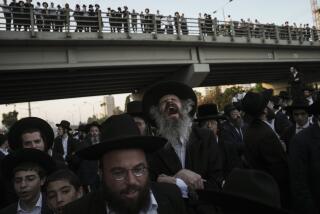Soviet Immigrants Clamoring to Be Drafted by Israeli Army
- Share via
JERUSALEM — Vladimir Gorelik spent two years maintaining nuclear missiles in the Soviet army before emigrating to Israel. Now he asks: “Do you think the Israeli army has a job like this for me?”
For now, the army is saying no to Vladimir--or Zeev, the Hebrew name he now uses--and thousands of other immigrants from the former Soviet Union and elsewhere.
In the midst of the largest draft of 18-year-olds in Israel’s history, the military has postponed taking virtually all new immigrants in their 20s or older until at least next year.
The army says the immigrants need more time to settle. But critics maintain that Israel’s budget-strapped military is trying to save the high cost of training and subsidizing immigrant soldiers.
The delayed draft probably means some immigrants will never have to serve. But immigrant supporters say being out of uniform also will leave newcomers out of step with a society where military service is an integral part of life.
“People who do the army are acclimatized to Israeli life,” said Yuli Kosharovsky, a Russian immigrant who ran unsuccessfully for Parliament. “Any denial of this obligation of equal status, of integration into society . . . is not good.”
The number of teens being called up in the draft each day this month is classified. But a military source said that Israel’s early 1970s baby boom has resulted in more 18-year-old recruits than the army can handle.
All Israeli men are drafted for three years and women for two years.
The army is so much a part of Israeli life that the August draft is accompanied by television shows and newspaper supplements advising draftees what to bring, how to get into shape, how to talk and, above all, how to cope.
“It’s my duty,” said Gili Shavit, whose brown hair hanging below his shoulders will soon be clipped by an army barber. “Besides, whoever doesn’t do the army will have problems later.”
Shavit was not just talking about bigger mortgages and other social benefits for veterans. Army service also introduces Israelis to an “old boy” network in civilian life. As a starter, veterans get preference in jobs.
Reserve Maj. Gen. Moshe Nativ, a former head of the army manpower division, was quoted by Yediot Aharonot as saying the army is saving money but losing potentially good soldiers by delaying the draft of young Soviets.
“How demented it is to forfeit on quality manpower like the immigration has brought us just to save a few million dollars,” he said.
More to Read
Sign up for Essential California
The most important California stories and recommendations in your inbox every morning.
You may occasionally receive promotional content from the Los Angeles Times.













